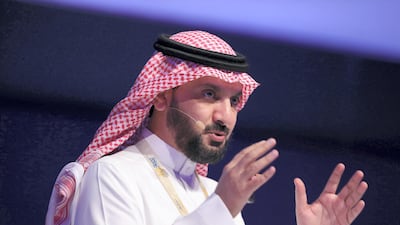Saudi Arabia is eyeing investments of 1.7 trillion riyals (Dh1.6tn) through a programme that integrates its mining, logistics and energy industries as part of its economic diversification drive, according to a government official.
The investments will be exclusively through the National Industrial Development and Logistics programme across all sectors, Aabed Al Saadoun, the country's deputy minister for companies affairs told The National in an interview in Dubai. "That is the total investment that has been calculated and estimated," he said.
His portfolio falls under the ambit of the kingdom’s energy, industries adn mineral resources ministry.
The programme, which is part of the large umbrella of the kingdom’s Vision 2030 diversification strategy, will see the launch of 300 initiatives that include incentives and discounts across the mining, logistics and chemicals sectors.
"We’re estimating to be among the top ten global producers for gold by 2030 and the second or third in phosphate,” added Mr Al Saadoun.
NIDLP is targeting 3.5 per cent year-on-year growth of petrochemicals in the kingdom to compete in the global market. Saudi Arabia, the Arabian Gulf region's biggest petrochemicals producer, has already begun implementing large-scale downstream projects such as the $20 billion oil-to-chemicals scheme on its Red Sea coast.
The kingdom is also in the process of integrating Saudi Basic industries Corporation through the sale of a 70 per cent stake in the region's biggest petchems company to Saudi Aramco, the world's largest's oil producing company.
The NIDLP scheme will see the development of 18 specialty chemical groups and conversion segments, said Mr Al Saadoun.
The programme will also push for the development of six industrial parks specialising in chemicals and compounds, complementing three currently operational ones, he added.
_______________
Read more:
GCC chemicals producers' revenue rose 17 per cent to hit $84.2bn in 2017
France's Total to build $5bn petrochemicals facility with Aramco in Saudi Arabia
Aramco’s potential Sabic stake acquisition could impact IPO, says CEO
_______________
The parks currently operational are Yanbu and Rabigh on the Red Sea coast, home to significant logistics and chemicals developments as well as Jubail in the Eastern province. Saudi Aramco and French energy major Total signed an estimated $9bn agreement for the development of a new petrochemicals complex in Jubail in October. Of the planned investment, $5bn would be available for engineering, and design, while the remainder would be invested in the provision of feedstock for petchems and specialty chemical plants, the firms said at the time.
Among the other parks under development are phosphate-related schemes at Waed Alshamal in the northern Turaif region, the development of heavy industry in the southern Jazan region, as well as aluminium, phosphate, steel, copper and industrial mineral projects in the eastern Ras Al Khair Industrial City. The development of Ras Al Khair as a manufacturing base has become increasingly important for Saudi Arabia, with Aramco recently signing an agreement with US-based National Oilwell Varco to develop a facility for the prodcution of drilling equipment.
The NIDLP programme would offer “preferential electricity tariffs for ten years” within the developing value parks, with access to loans "up to 75 per cent of value with a 30-month grace period", Mr Al Saadoun said in a presentation at a conference in Dubai.
Priority would be given to locally-manufactured products through local content programmes, he added.
Discounts will be available for both private and public players in the chemicals value chain, depending on the categories of products being developed, Mr Al Saadoun told The National.
The programme would see the three industries of mining, logistics and energy working “in sync” rather than in competition, he said.
"They’re not competing with each other. They talk to each other and [are] in sync with each other. So if we develop an industry, we try to see how we can link it to the mining and logistics and wherever required, energy,” he added.


